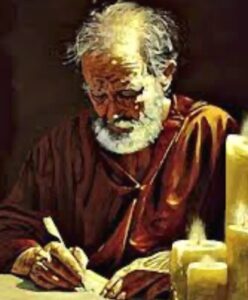 Peter is giving instruction to the elders of the churches in light of the suffering they are experiencing and the suffering they will be experiencing. In this podcast I will also review some things John Piper said where he defines what an elder is.
Peter is giving instruction to the elders of the churches in light of the suffering they are experiencing and the suffering they will be experiencing. In this podcast I will also review some things John Piper said where he defines what an elder is.
The video link is here:
The links to Spotify and iTunes is to the right.
Here is the transcript used to make today’s podcast:
Chapter 5
5:1-4 Elders
1 (Therefore)To the elders among you, I appeal as a fellow elder and a witness of Christ’s sufferings who also will share in the glory to be revealed:
Who were the elders? What purpose did they serve in the Church?
The “elders” are the leaders of the local congregations. The institution of a group of older and wiser men providing direction and rule goes back to the early days of Israel as a people. This was done both nationally and locally. Thus there were “elders” of the Sanhedrin in Jerusalem as well as “elders” of local synagogues. The institution of eldership was adopted by the Jerusalem church (Ac 11:30; 21:18), and Paul and Barnabas applied it to the local congregations they founded on their missionary journeys (Ac 14:23; 1Ti 3:1-7; Tit 1:5ff.).
The early church utilized more people than the church today does (see comment on 4:10; cf. Eph 4:12) and so put spiritual leadership in the hands of a plurality.
According to Justin Taylor (2019) in his blogpost “What are the Requirements to be an Elder?”, the following summarizes some of the qualifications of eldership based on a seminar by John Piper.
- one who has aspiration to the office –He aspires to the role of being an elder, bishop, overseer, pastor, shepherd. This does not exclude the possibility that he is sought out and urged to be an elder. But no pressure should be used that would result in an unwilling, half-hearted service.
- above reproach – He lives in a way that gives no cause for others to think badly of the church or the faith or the Lord.
- husband of one wife – The question is probably one of notoriety. What is this man’s reputation with regard to whether he has had one wife or not?
- sober-minded, not a drunkard – He exercises self-control and mastery of his appetites. He prizes freedom from enslavements to such a degree that no bondage is yielded to.
- self-controlled – He is sensible. He is prudent. He is reasonable. He has good judgment. He sees things as they really are. He knows himself well. He understands people and how they respond. He is in touch with reality, such that there are no great gaps between what he sees in himself and what others see in him.
- respectable – He is honorable and dignified. He comports himself in situations so as not to step on toes unnecessarily. He does not offend against propriety.
- hospitable – He loves strangers. He is given to being kind to newcomers. He makes them feel at home. His home is open for ministry. He does not shrink back from having guests; he is not a secretive person.
- able to teach – He is an apt teacher, skilled in teaching. He knows biblical doctrine well and is able to explain it to people. He is astute enough theologically that he can spot serious error and show a person why it is wrong and harmful.
- not violent – He is not pugnacious or belligerent. His temper is under control. He is not given to quarreling or fighting. He has a conciliatory bent. His feelings are not worn on his sleeve. He does not carry resentments. He is not hypercritical.
- gentle – He is not harsh or mean-spirited. He is inclined to tenderness. He resorts to toughness only when the circumstances commend this form of love. His words are not acid or divisive but helpful and encouraging.
- not quarrelsome – He is peaceable. He is lowly in his demeanor, not speaking much of himself or his achievements. He counts others better than himself and is quick to serve. He sincerely gives God the credit and honor for any accomplishments.
- not a lover of money – He puts the kingdom first in all he does. His lifestyle does not reflect a love of luxury. He is a generous giver. He is not anxious about his financial future. He is not so money-oriented that ministry decisions revolve around this issue.
For the rest of this list you can go to the following URL:
https://www.thegospelcoalition.org/blogs/justin-taylor/what-are-the-requirements-to-be-an-elder/.
For an organization to function, there has to be a hierarchy. In The Catholic Church the hierarchy is as follows, from top down:
- Pope
- Cardinals
- Archbishops
- Bishops
- Priests
- Deacons
In my church the hierarchy looks as follows:
- Head Pastor
- plurality of associate pastors – education, worship, outreach, missions etc
- Deacons
- Bible Study/Sunday School teachers
It’s a loose organization, and it varies from church to church as each church in my denomination (Southern Baptist) is autonomous i.e. self-governing. Some other denominations mirror the Catholic church in function – using different titles.
The point to all this is that elders are held to a high standard of Biblical knowledge and lifestyle. By virtue of the title ”Elder”, they are not particularly young. As my son would say – “Ya gotta have mileage”. Being older is not enough – that mileage must reflect a life of obedience and reverence to God.
It is notable that Peter does not issue commands as an apostle (much less as a “pope”) but speaks as a fellow elder (cf. also John in 2Jn 1; 3Jn 1).
It is my observation that the title “Elder” is earned by a displayed life of reverence and humility with God at the center. Within that title there can be a variety of tasks or areas of leadership. At least that is my thought based on what Paul says in Ephesians 4 and elsewhere.
Ephesians 4:11 So Christ himself gave the apostles, the prophets, the evangelists, the pastors and teachers, 12 to equip his people for works of service, so that the body of Christ may be built up.
Peter was an Apostle, as well as an evangelist, a pastor and a teacher. But he did not refer to himself with any exalted title – in his words, he was a “fellow elder”, an equal among equals.
In verses 2 through 4, Peter gives a great picture of what an elder looks like and acts like. They are shepherds and servants, examples to the flock of what Godly living looks like.
2 Be shepherds of God’s flock that is under your care, watching over them—not because you must, but because you are willing, as God wants you to be; not pursuing dishonest gain, but eager to serve; 3 not lording it over those entrusted to you, but being examples to the flock.
The motivation of elders should be divine, not human. Nor should the motivation be financial, though elders were evidently paid in the early church and handled the finances of congregations (cf. 1Co 9:7-11; 1Ti 5:17). Not money but enthusiasm and zeal for God and his work must motivate elders. They are not to be “lords” over “those entrusted to” them. Probably in each congregation, individual elders had portions of the congregation for which they were particularly responsible. Elders should endeavor to be patterns for Christ’s sheep.
My impression is that Elders are to be “player-coaches” in their leadership style. In the military, this style might be called “leading from the front”, where the leadership is actively involved alongside those they lead. They don’t sit on a throne and bark orders. They work.
4 And when the Chief Shepherd appears, you will receive the crown of glory that will never fade away.
There’s a lot here to mull over.
Be Blessed!
In His Grip,
Paige

1 Peter 5:1-4… To the Elders
VIEW THE COMMENTS